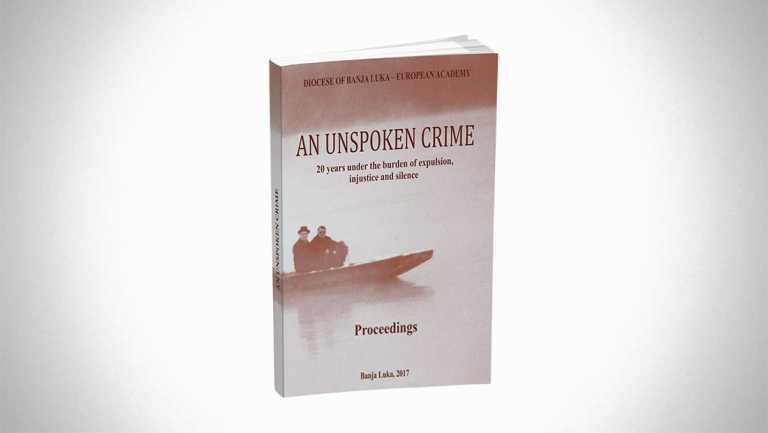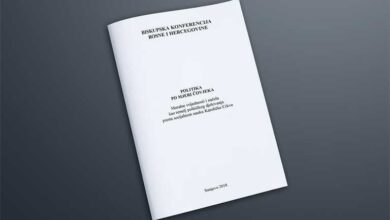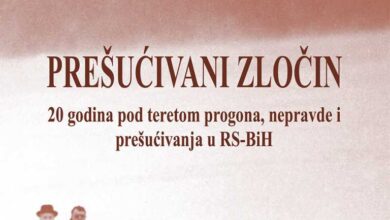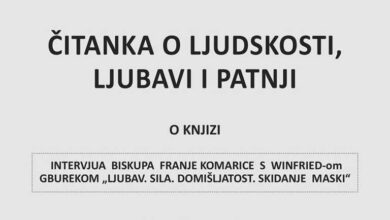EN: AN UNSPOKEN CRIME

DIOCESE OF BANJA LUKA – EUROPEAN ACADEMY
AN UNSPOKEN CRIME
20 years under the burden of expulsion, injustice and silence
“Truth may be pressured, but never crushed.“
„Truth may grow old, but it does not die.“
(proverbs)
FOREWORD
The ethnic cleansing that took place in the territory of Banja Luka and other regions of Republika Srpska has borne bitter fruit. Today, the decimated Croat autochthonous population faces a difficult predicament: to survive or to disappear. According to the 1991 population census, there were more than 140,000 Croats living in the region; at present, less than 10,000 remain in the Serb Entity of Bosnia and Herzegovina. The alarming status of the Croat population today, and during the entire post-war period in Republika Srpska, shows all the indicators of genocide.
Twenty post-war years burdened by persecution, injustice and the suppression of truth, is a very long time. On 13 November 2015, the European Academy of the Diocese of Banja Luka organised an international study day under this very slogan, to mark the 20th anniversary of the expulsion of Croats, Bosniaks and others from the wider Banja Luka area. Throughout those years, the Catholic Church in the Diocese of Banja Luka has continuously reminded the public of these tragic events by organising prayer meetings, masses and press conferences, which have been convened annually in mid-August by Franjo Komarica, PhD, Bishop of Banja Luka. Like a solitary traveller in the desert, the bishop persists in drawing the public’s attention to the fact that Croats, Bosniaks and others underwent immense human suffering and injustice during the persecutions of the 1990s, and suffered subsequent hardship and misfortune that have rarely been resolved in a satisfactory manner, and have left many issues open.
The fact that the truth about these tragic and disturbing events, which contributed substantially to the current position of the Croat population in Republika Srpska, has been methodically suppressed and concealed from the public for the last 20 years, carries a singular weight and deserves special notice. It was only because of these responsible persons in the Diocese of Banja Luka, and all those who preserved the truth about the injustices and sufferings in their hearts, and who would not renounce their right to their identities and their hometowns, that the truth about these horrendous crimes has not remained hidden. Yet it is a strange and dispiriting fact that the topic has become undesirable and impermissible, especially among politicians – both local and international – and representatives of the judiciary, who have a legal obligation to protect the dignity and human rights of every human being. Whenever the issue of the countless crimes against Croats and the ethnic cleansing in the Banja Luka area has been discussed publicly, efforts have been made to prevent such open discourse from
receiving wide coverage.
Moreover, historical facts were fabricated to accommodate the brazen claim that “Croats and Bosniaks from the wider Banja Luka area left of their own accord, and nobody forced them out”.
There are some who would like nothing better than to forget as quickly as possible, and to prevent at any cost a public dialogue on what happened in this city and its region 20 years ago, in an area where, for the most part, there was no armed conflict. However, the truth is that many atrocious and dramatic things did occur in here, in order to achieve the criminal expulsion of the non-Serbian population, primarily Croats and Bosniaks, but also others, from their homes and hometowns. As expert on Banja Luka culture Srđan Šušnica, M.A., observes: “Almost all non-Serbian, Muslim, Catholic, Croatian, Bosnian or Bosnian and Herzegovinian cultural and memory narratives and identifications located in Banja Luka and the territory of today’s Republika Srpska are under a thick carpet of oblivion. All street names, school names, and village names that bore some Bosnian and Herzegovinian, Muslim or Catholic symbolic narrative, or were perceived as insufficiently Serbian, were erased and replaced with symbolic Serbian identifications […]” It is considered inadvisable to raise these irrefutable facts. Instead, total amnesia is recommended.
At the time, the global media mostly ignored the events in this part of Bosnia and Herzegovina. The few journalists who ventured into the area found that local incidents were not compelling enough, or not gruesome enough, aside from the discovery of the Keraterm, Omarska and Trnopolje concentration camps. They were expected to deliver more shocking scenes to their audiences, and the Banja Luka region could provide “only” the abuse and murder of hundreds of innocent civilians. Yet ultimately, the result here was equally tragic, and was comparable to events in other places in Bosnia and Herzegovina. A large percentage of two communities disappeared from Banja Luka. The majority of the Croat population has been completely wiped out, erased from the region.
November 2015 marked the 20th anniversary of the Dayton Peace Accords. This event was commemorated on many levels. While some had cause to celebrate victory and freedom, for others the anniversary was an occasion on which to draw attention to their suffering. Few mentioned the crimes that were carried out in this part of Bosnia and Herzegovina. This is why we consider it our obligation and responsibility to the victims of persecution, to the tens of thousands of the disempowered, to history and truth, to speak out about these tragic events that happened 20 years ago, when the crime of persecution and expulsion was committed. In addition, we consider it necessary to speak out about the no less tragic post-war years, when much was done to cement the results of persecution, and to deny tens of thousands of disempowered citizens the right to return to their homes, their homeland and a life of dignity.
We are grateful to all the authors and participants of the International Study Day, who willingly submitted their contributions to establish the facts and scientifically evaluate and clarify this tragic period. As Miljenko Aničić, PhD, director of the European Academy stressed in his introductory remarks: “We are confident that by doing so, we serve the future of all those who live here, and the future of this country.”
This is why we believe that, following a number of individual contributions during the post-war period, the International Study Day was organised at an opportune moment, with the objective of systematically defending and salvaging the facts from falsification and misinterpretation, and also from denial. In order to achieve this, the relevant and verified facts regarding the expulsion or, more accurately, the planned extermination of local Croats, Bosniaks and others from this area were analysed in a systematic and studious manner, using an interdisciplinary approach to evaluate the available historic material and survivors’ testimonies. The same scientific methods were applied to ascertain who obstructed the viable return of Croats and others to Republika Srpska, and why.
The kindness and understanding of all participants at the conference allowed us to publish all the lectures in a book titled An Unspoken Crime, which is the first publication in a new series of books produced by the European Academy of the Diocese of Banja Luka, bearing the indicative title “Roots”. This publication, along with those that preceded it, will doubtless serve as a reliable source and starting point for further diligent, systematic, professional and scientific studies that will help to elucidate these and other tragic events from our recent past in this part of Bosnia and Herzegovina.
I would like to express my gratitude to all the authors who were willing to set aside their regular obligations in order to provide expert and peer-reviewed papers on the tragedy that occurred in the wider Banja Luka area 20 years ago: our host, Franjo Komarica, PhD, Bishop of Banja Luka; Cardinal Vinko Puljić, Archbishop of Vrhbosna; Patsy Sorensen, former Member of the European Parliament and Member of the City Council of Antwerp, Belgium; Miljenko Aničić, PhD, Director of the Banja Luka European Academy; Šimun Penave, M.A., Croatian Institute of History, Department for the History of Slavonia, Srijem and Baranja, Slavonski Brod; Srđan Sušnica, M.A., expert on Banja Luka culture; Josip Jurčević, PhD, Institute of Social Sciences Ivo Pilar, Zagreb; Mujo Begić, PhD, Institute for Missing Persons of Bosnia and Herzegovina, Bihać; Velimir Blažević, PhD, Franciscan, retired professor from Banja Luka; Ivica Božinović, M.A., Principal of the Catholic School Centre in Banja Luka; Andrej Plenković, M.Sc., Member of the European Parliament and Vice-Chair of the Committee on Foreign Affairs of the European Parliament; Ivo Miro Jović, PhD, University “Vitez” of Vitez; Miodrag Živanović, Faculty of Philosophy, Banja Luka; Alojz Jakirčević, Mayor of Davor during the expulsion of the non-Serbian population, who fled by boat at Davor; Frano Piplović, M.A., Head of Studies at the Banja Luka European Academy; Gordana Katana, Oslobođenje journalist for Banja Luka; Davor Čordaš, M.A., Minister for Refugees and Displaced Persons of Republika Srpska; and Prof. Armina Galijaš, PhD, from the University of Graz, a native of Banja Luka, who also submitted a paper. As many authors refer to reports by Polish diplomat and humanitarian Tadeusz Mazowiecki, Special Rapporteur of the UN Commission on Human Rights, we have decided to include in this book his reports on the subject of ethnic cleansing by Bosnian Serbs in the Banja Luka region, covering the period from 1992 to 1995.
We know that only the truth can set us free and guard us from potentially fatal mistakes, and future atrocities. As Miljenko Aničić, PhD, remarked in his closing statement at the International Study Day, “This conference and other similar conferences that are planned in the future will help us elucidate this and many other tragic events that have repeatedly wreaked havoc on this region, and its inhabitants of all national affiliations.”
By publishing these proceedings we wish to provide concrete assistance to the revelation of unspoken and suppressed truths, thereby laying the foundation for a desired and attainable common future based on truth and justice, forgiveness and reconciliation.
Frano Piplović




